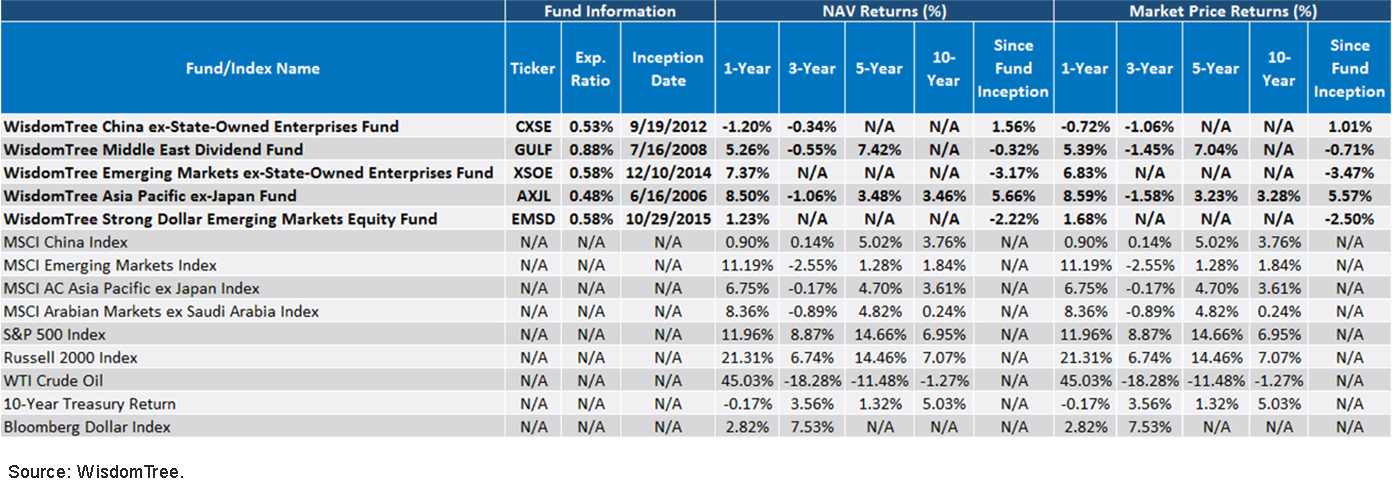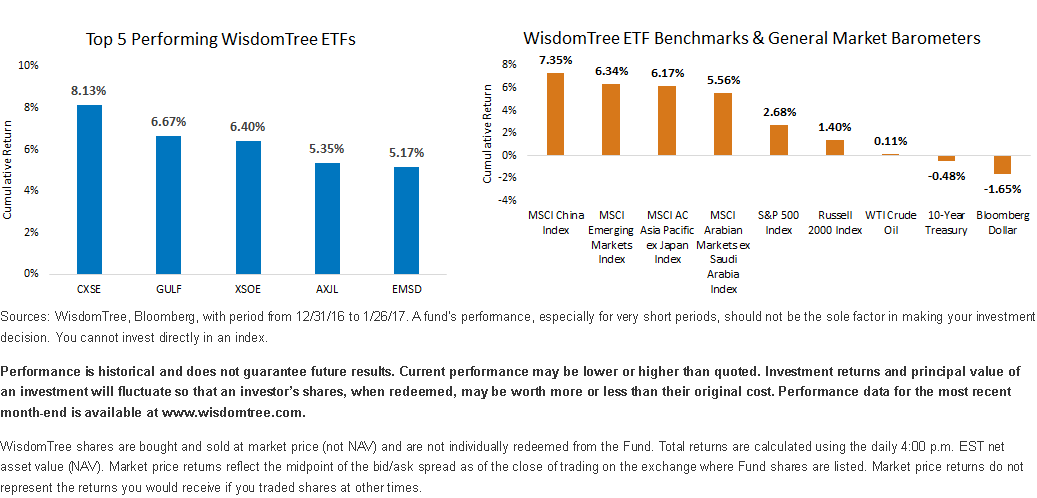What’s Working In 2017? Surprisingly, China
If January was any indication, we are all going to be in for a year of news flow and media frenzy like few we have ever seen. Nearly every day, we are hearing different announcements coming from policy makers, all of which have potential importance for markets.
2016 Ended Strongly
As 2016 ended, people had seen a few big-picture events impacting asset-class performance and investor portfolios in a significant manner:
- Small-Cap Stocks Ripped: U.S. small caps1 went on a major tear after the surprise election victory of Donald Trump. Investors readjusted their expectations for higher potential growth and higher potential inflation. The cyclical nature of small caps can be a major beneficiary, not to mention the fact that small-cap companies tend to do the majority of their business inside the U.S. This typically results in 1) insulation from a stronger dollar and 2) greater potential impact from any corporate tax cut.
- The 10-Year Treasury Note Yield Spiked: This was another impact of changing expectations of future economic growth and inflation. Since many yields tend to trade at a spread to this level and rising yields mean falling prices in the world of bonds, bond portfolios were notably running into the wind at the end of 2016.
- U.S. Dollar Strengthened: Dollar strength was the clear trend against almost all other world currencies throughout the period from 2013 to 2015, but the first 11 months of 2016 saw a distinct change in trend. Post-U.S. presidential election, the U.S. dollar began to strengthen again, most notably against the yen, which had strengthened all the way to 100 over the summer but ended 2016 at 117.2
Would any of these trends continue, or did they simply represent reflation “blips” that would quickly reverse once the world transitioned from a President-elect Trump to a Trump presidential administration? While the exact answer is something we’ll only know in hindsight, we believe this is a question on nearly every investor’s mind as we start 2017 and look at the new presidential administration.
Surprising leaders in the current environment are emerging markets, the Middle East and China in particular.
Despite all the trade rhetoric and fears Trump is going to instigate a trade war with China, it is interesting that China is the top standout in early 2017, particularly companies led by the Chinese consumer. If this trend continues and China’s growth can stay positive, that would be very supportive for global asset prices and market sentiment.
WisdomTree’s Five Top Performing Exchange-Traded Funds (ETFs) for January 2017
WisdomTree had 94 U.S.-listed ETFs as of January 31, 2017, and these covered almost all the major markets around the world. Knowing the top performers (we showcase the top five below) over any period says a lot about which global markets are doing particularly well at that time.
Average Annual Total Returns as of December 31, 2016
(Click on image to enlarge)
WisdomTree’s Top Five ETFs by NAV Cumulative Return (& Market Benchmarks to Provide Context)
(Click on image to enlarge)
For definitions of indexes in the chart, visit our glossary.
•CXSE Was the Top Performer: Over this period, Consumer Discretionary and Information Technology stocks in CXSE did particularly well. The Index that CXSE tracks before fees, the WisdomTree China ex-State-Owned Enterprises Index, emphasizes Consumer Discretionary and Information Technology and tilts away from Financials, Energy, Materials and Telecommunication Services. Some standout performers at the individual firm level in CXSE’s top 10 holdings over this period: Baidu (+6.41%), JD.com (+11.32%), Tencent Holdings (+8.00%), Alibaba (+17.01%), Delphi Automotive (+6.70%), CTrip.com International (+8.45%) and NetEase (+17.00%).3
•GULF: Approximately 50% of this Fund is in the Financials sector, which did well over this period. These markets have typically been influenced by the price of oil. Compared to the beginning of 2016, oil prices have been relatively stable, thereby lending support to equities in this region.
•XSOE: This Fund tracks the performance of the WisdomTree Emerging Markets ex-State-Owned Enterprises Index, an approach that removes exposure to firms with greater than 20% ownership by sovereign entities. A major result—similar to what we mentioned with CXSE—is a tilt toward Consumer Discretionary and Information Technology. Now, it’s worth mentioning that all 11 sectors in emerging markets—whether in XSOE or the MSCI Emerging Markets Index—were positive over this period.4
•AXJL: In this Fund, there were double-digit exposures to Australia, Taiwan, Hong Kong, China and South Korea over the period from December 31, 2016, to January 26, 2017. Of these, Hong Kong and South Korea were the strongest—generating approximately 7% returns. All of these markets were positive over this period.5
•EMSD: This unique approach to emerging market equities did not have exposure to the Energy, Materials, Financials, Telecommunication Services or Utilities sectors, instead placing heavy emphasis on Information Technology and Consumer Discretionary—similar to XSOE. Taiwan and South Korea were also the two largest market exposures—both of which also did quite well.
In short, we have been surprised thus far in 2017 by these results, which compare to an S&P 500 Index below 3% over this period and a Russell 2000 Index below 1.5% over this period. China was the standout, and we look forward to seeing if this trend can sustain further into 2017.
1Refers to the Russell 2000 Index from 11/8/16 to 12/31/16.
2Source: Bloomberg.
3Sources: WisdomTree, Bloomberg, with holdings depicted performing above 5.00% from 12/31/16 to 1/26/17 and being within the top 10 holdings for CXSE. Average weights over this period for mentioned securities: Baidu, 6.92%; JD.com, 6.53%; Tencent Holdings, 6.50%; Alibaba, 6.49%; Delphi Automotive, 5.27%; CTrip.com International, 4.15%; and NetEase, 2.91%. Holdings subject to change.
4Source: Bloomberg.
5Source: Bloomberg.





